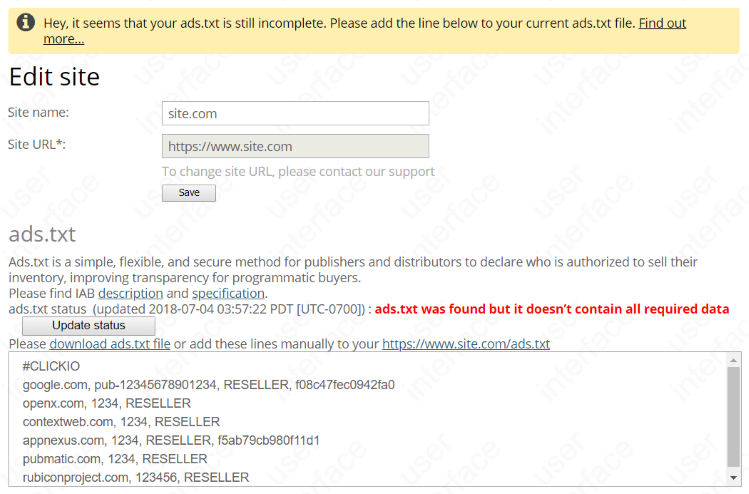Ads.txt: what it is and why it is important for publishers

There is a tool that can help publishers efficiently monetize their websites. This tool is called ads.txt. Although it is very useful, many media owners are still not familiar with it, or struggle to understand its functionalities. In this post, we will explain what ads.txt is and why it is so relevant for publishers.
Summary
- What ads.txt is
- How ads.txt works
- How to add ads.txt to your website
- How to validate ads.txt
- Ads.txt: why it is important for publishers
What ads.txt is
Ads.txt is a text file stored in the main folder of a website that contains the list of companies authorized to sell the site’s inventory. IAB Tech Lab released this tool in May 2017 in order to solve the problem of ad fraud by means of something able to “certify” the authenticity of advertising spaces. In particular, IAB wanted to find a solution to the so called “domain spoofing”, which is the practice of fraudulently passing off low quality inventory as premium one. This phenomenon was indeed quite common: many buyers were deceived into purchasing ad spaces that were sold, for example, as from Nytimes.com, but their ads ended up appearing on other, much less prestigious, sites.
Ads.txt solves this problem in a very simple way: it just lists all the platforms that are authorized to sell a publisher’s inventory.
How ads.txt works
It’s extremely easy to access this text file. You just need to add “/ads.txt” to the website domain on the address bar of the browser, for example “nytimes.com/ads.txt” and that’s it. By reading this file, a buyer can therefore verify whether the platform that is trying to sell the Nytimes.com inventory is actually among the authorized sellers of the website. If the platform is not on the list, there is a good chance that the inventory is fake.
How to add ads.txt to your website
To incorporate ads.txt in your website, you just need to follow a very simple procedure. First of all, you have to create a standard text file and populate it with a list of your ad sellers. Each line of the file has to contain three mandatory fields separated by a comma:
- the name of the advertising platform domain you use (the domain of the seller);
- the code that identifies your website in the advertising platform (the Publisher ID or seller network ID);
- the type of commercial relation you have with the seller (either “Direct” or “Reseller”).
Remember to use one single line for each advertising seller.
Once you have created the list of all your advertising partners, you have to save the file and put it in your website’s root folder.
How to validate ads.txt
But the work is not finished yet. Ads.txt is only useful if it is correctly compiled. For this reason, it is necessary to verify that the list doesn’t contain any mistake. To this end, there are specific tools named “validators” that are able to check for errors or missing data. By just entering an ads.txt URL, validators can verify many things, such as if all the fields are complete, if the ad system domain is valid or if the publisher ID is present.
Ads.txt: why it is important for publishers
As we have seen, ads.txt is extremely easy to use. At the same time, it is a very important tool for many reasons.
First of all, this solution brings benefits to the whole digital market. It avoids the spreading of fraudulent activities, hence increasing the general trust in programmatic buying practices. But beyond this broad vision, ads.txt can improve the monetization of your properties: making public the names of your legitimate sellers, this tool certifies your inventory as authentic, and gives it the value it deserves.
If you’re still not convinced to use this tool for your property, you should know that many DSPs limit their ad purchases to the websites that provide ads.txt files. So, if your website doesn’t provide one, it could be excluded by a growing number of potential buyers, with possible negative consequences on your ad revenues.
Clickio takes extremely seriously the safety of publishers and buyers. That’s why we have included an ads.txt validator in our platform, to provide publishers with a way to constantly verify and keep track of their ads.txt file.

Contact us if you want to know more about ads.txt and how to validate it.
